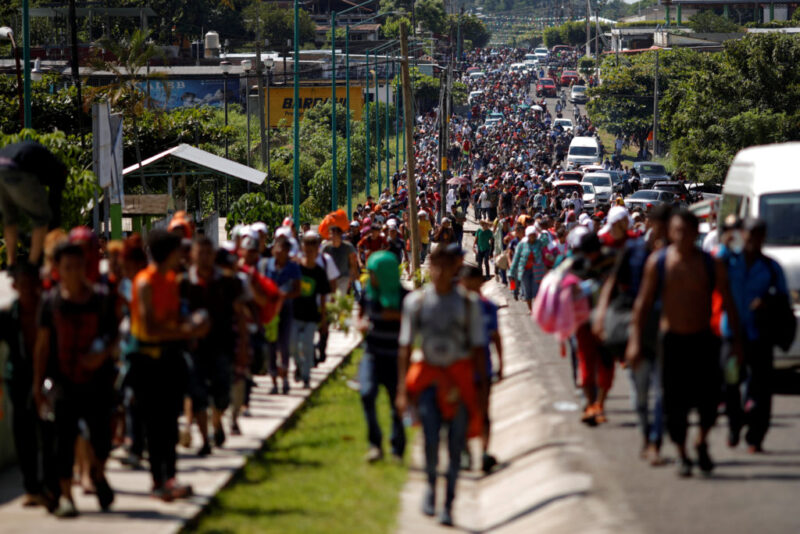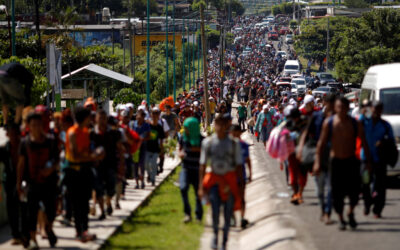
Mexico

Cuban Migrant Caravan Shifts Destination to Mexico City
A new caravan led mainly by Cuban migrants is making its way through southern Mexico. But unlike past movements, this group is not trying to reach the United States. Instead, they are heading for Mexico City, hoping to build a new life there. This shift marks a dramatic change in migration patterns. For years, the U.S. was the ultimate goal for most migrants traveling through Mexico. Now, stricter border controls and changing political realities have pushed many to look for safety and opportunity elsewhere. A Journey with a New Goal The caravan began in Tapachula, near the border with Guatemala. It includes more than a thousand people from Cuba and other Latin American countries. They are traveling north on foot and by bus, aiming to reach the Mexican capital. Their message is simple: they want permission to live and work in Mexico legally. Many of them have waited months in overcrowded shelters in Tapachula. Some were stuck there for nearly a year, unable to move north or find jobs. Frustration and hunger pushed them to organize and take to the road. They believe reaching Mexico City will give them a better chance to speak directly to government officials and demand legal documents. Trump’s Policies Shift the Migration Map Since Donald Trump returned to the White House in early 2025, the U.S. has seen a sharp decline in illegal border crossings. The administration has expanded deportations, increased patrols, and enforced new agreements with Mexico and Central American nations. (MORE NEWS: Apple Pulls ICE-Tracking Apps from App Store) The New York Post is reporting that ICE is on track to deport 600,000 illegal immigrants in 2025 and 2 million have left voluntarily. “This is just the beginning.” As a result, the number of migrants attempting to cross into the U.S. has dropped to historic lows. This has forced many to rethink their plans. For the first time in years, a large number of migrants now say they intend to stay in Mexico rather than risk the journey north. Some say they no longer see the U.S. as a welcoming place. Others fear being detained or deported if they try to cross. For them, Mexico represents a chance to work, earn money, and live without constant fear of arrest. Seeking Opportunity Inside Mexico Mexico, specifically Mexico City, is becoming a new destination for migrants across the region. Many believe they can find jobs in construction, agriculture, or tourism. Some also hope to start small businesses or join family members already living in the country. The Mexican government has been trying to manage this new wave of settlement. Officials have offered temporary humanitarian permits that allow migrants to travel and seek work. However, these permits often expire after 30 days, leaving many in legal limbo once again. Many immigrants have been outright denied or have received pushback on their requests, leaving them frustrated. A migrant caravan leaves southern Mexico and heads for the capital Mexico City in search of better opportunities. The Cuban and Haitian migrants cite red tape and high costs as barriers to making life in Mexico work pic.twitter.com/G35cg1NBc9 — Reuters (@Reuters) October 2, 2025 Despite the uncertainty, migrants remain hopeful. They see Mexico City as a symbol of progress — a place where their voices can be heard and their paperwork processed faster. Hardships on the Road The journey north is dangerous and exhausting. Migrants face long days of walking under intense heat with little food or water. Some travel with small children or elderly relatives. Along the way, they risk robbery, extortion, and abuse from criminal groups that target vulnerable travelers. Local residents sometimes offer food and shelter, but others are less welcoming. Some communities fear that large groups of migrants will strain local resources or increase insecurity. Despite these challenges, the caravan continues to move forward. (RELATED NEWS: Cartel “La Diabla” Busted for Baby, Organ Ring in Mexico) Mexico’s Complex Role Mexico now faces a difficult balancing act. On one hand, it must show compassion and manage the humanitarian crisis. On the other, it must maintain cooperation with the United States, which continues to pressure Mexico to control migration flows. The Mexican National Migration Institute has been documenting participants and reviewing cases to determine who may qualify for residency. In past caravans, authorities have used a strategy of dispersing migrants to other regions to prevent large concentrations near the capital or the U.S. border. A Turning Point in Migration The Cuban-led caravan may mark the beginning of a new migration era. Instead of using Mexico as a bridge to the United States, many migrants now view it as a final destination. Economic opportunity, cultural familiarity, and proximity to home make Mexico an appealing choice. While challenges remain — from bureaucracy to discrimination — migrants say they prefer the uncertainty of Mexico over the hostility they expect at the U.S. border. This shift could reshape regional migration policies for years to come. The U.S. may see reduced border pressure, while Mexico will need stronger systems for asylum, employment, and integration. How both governments respond will define the next chapter in North American migration. The Road Ahead: A Hard Truth As the caravan moves closer to Mexico City, the country faces mounting pressure. Streets and shelters are already crowded with people waiting for government help. Local resources are stretched thin, and frustration is growing among residents who feel their communities are being overrun. Many Mexicans argue it’s time to draw a firm line. They believe the government must stop encouraging massive caravans that drain public funds and disrupt local life. What began as a humanitarian issue has become a matter of national security and social stability. The reality is that Mexico cannot absorb endless waves of migrants. Jobs are limited, infrastructure is weak, and public services are already under strain. While compassion matters, so does responsibility. Allowing thousands of undocumented migrants to remain without control invites long-term problems that will hurt ordinary citizens first. The hard truth for some is that the…

Cartel “La Diabla” Busted for Baby, Organ Ring in Mexico
Martha Alicia Mendez Aguilar, better known as “La Diabla,” thought she could hide in Juárez, Mexico. But earlier this month, she was captured in a joint U.S.–Mexico operation. The charges against her aren’t about drugs or weapons. They’re darker. She’s accused of running a cartel baby-trafficking and organ-harvesting ring—an operation so disturbing that even seasoned investigators were stunned. Her arrest is a big win for law enforcement, but the story behind it reveals something bigger. Cartels aren’t just about drugs anymore. They’re moving into crimes most people never thought possible. And that makes this case one of the most chilling in years. Who Exactly Is “La Diabla”? Aguilar isn’t just another cartel name. She worked with the Jalisco New Generation Cartel, one of Mexico’s most violent groups. Her nickname, “La Diabla,” which means “She-Devil,” says it all. She earned a reputation for being ruthless. According to investigators, she targeted poor, vulnerable women—many of them already pregnant. She promised them help, sometimes money, sometimes medical care. Once she had them in her grip, she lured them to hidden clinics. (MORE NEWS: U.S. Strike on Venezuelan Drug Cartel Boat Signals New Era) That’s where the horror began. Unregulated cesarean operations were performed under dangerous conditions. Some mothers didn’t survive. Their newborns were taken and sold. Reports say babies went for as much as $14,000 each. On top of that, the mothers’ organs were harvested and sold on the black market. Think about that for a moment. Babies sold like merchandise. Mothers treated as disposable. It’s the kind of cruelty that earns a person the name “La Diabla.” How She Got Caught Her downfall came on September 2. Authorities tracked her to Juárez, right across the border from El Paso, Texas. Mexican officials worked side by side with U.S. agencies to pull off the arrest. The U.S. National Counterterrorism Center had been involved for months. Its director, Joe Kent, said her capture was crucial to saving innocent lives. He also pointed out something many people don’t want to hear: cartels are diversifying. Drugs aren’t the only game anymore. They’re moving into new areas—human trafficking, organ sales, cybercrime—anything that brings in cash. That’s why the U.S. recently designated groups like the CJNG as foreign terrorist organizations. The goal is to give law enforcement more tools to shut them down. Aguilar’s arrest is proof that approach can work. Thanks to @POTUS, cartels are finally being treated as terrorists. @ODNIgov‘s NCTC recently provided intel to Mexican law enforcement partners that led to the arrest of Martha Alicia Mendez Aguilar, known as ‘La Diabla’ — a CJNG cartel-affiliated baby trafficker, in Juarez,… pic.twitter.com/CRNgJWVHkV — NCTC Director Joe Kent (@NCTCKent) September 24, 2025 The Office of the Director of National Intelligence, Tulsi Gabbard released a statement praising the multi-country, multi-agency operation that led to Aguilar’s arrest: Why Cartels Do This With cartels, the answer is always about money—and opportunity. Drug trafficking is risky. Border security is tougher, and competition between cartels is brutal. By branching out into other crimes, they spread the risk and increase their profits. Babies and organs fetch high prices. At the same time, poor women are easy targets. Many live in places where health care is scarce and oversight is weak. Cartels know they can operate in those shadows. And unlike drug shipments, which face heavy surveillance, these crimes are easier to hide. In short, it’s a perfect storm: desperate victims, weak systems, and greedy criminals. What Happens Next Authorities are now trying to map out Aguilar’s network. Who helped her? Were doctors involved? How far did the trafficking chain stretch? Those questions will take time to answer. There are also big legal challenges. These crimes cross borders, which means multiple countries have to work together. It’s messy, and cartels count on that. Still, her arrest sends a loud message: no one is untouchable. At the same time, this case shows prevention is just as important as prosecution. Vulnerable women need more protection. They need safe hospitals, real economic options, and information that helps them spot dangers before it’s too late. Without that, criminals like Aguilar will always find victims. Why This Story Hits Hard Cartels have always been ruthless. But this feels different. For years, people thought of cartels as drug dealers and smugglers. Now we see they’ll exploit life itself as a commodity. Babies sold to the highest bidder. Women discarded for parts. It’s a level of cruelty that forces everyone to pay attention. And it’s not just about Mexico. When babies are sold across borders and organs are trafficked into international markets, the whole world is involved—whether it wants to be or not. A Wake-Up Call The capture of “La Diabla” is a defining moment in the war on cartels. They are evolving, adapting, and looking for new ways to make money. Law enforcement can strike back when nations work together. But the bigger fight is still ahead. Networks like Aguilar’s don’t die with one arrest. They regroup, they shift, and they keep going. That’s why governments need to move fast, not just to punish criminals but to protect the people most at risk. “La Diabla” may now be in custody, but her crimes remind us of something chilling: as long as desperation exists, cartels will exploit it. Her arrest is a victory—but also a warning that the darkest chapters of cartel violence may not be behind us. Cut through the noise. Drown out the spin. Deliver the truth. At The Modern Memo, we’re not here to soften the blow — we’re here to land it. The media plays defense for the powerful. We don’t. If you’re done with censorship, half-truths, and gaslighting headlines, pass this on. Expose the stories they bury. This isn’t just news — it’s a fight for reality. And it doesn’t work without you.
